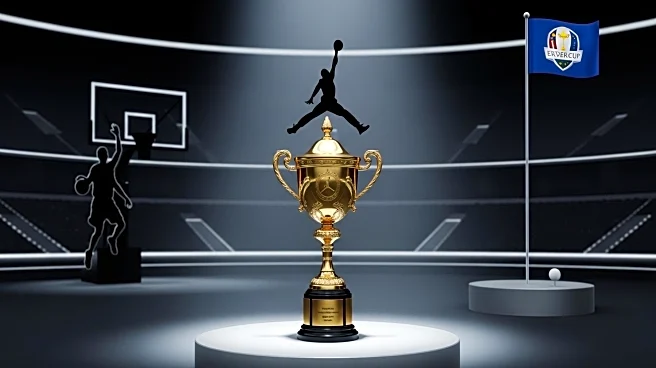What's Happening?
Luke Donald, the captain of the European Ryder Cup team, has been influenced by NBA legend Michael Jordan in his approach to leadership. Donald, who has captained the team to victory in Rome and is leading them again, emphasizes the importance of teamwork and collective strength, drawing from Jordan's values. Donald's friendship with Jordan began in the early 2000s when he played golf with him in Chicago. This relationship has allowed Donald to learn from Jordan's team-oriented mindset, which he applies to his own teams. Donald has reached No. 1 in the world golf rankings and held that position for 56 weeks, despite never winning a major title.
Why It's Important?
The influence of Michael Jordan on Luke Donald highlights the cross-sport impact of leadership philosophies. Jordan's emphasis on teamwork and collective effort resonates in Donald's approach to captaining the European Ryder Cup team. This philosophy is crucial in sports where individual talent must be integrated into a cohesive team strategy. Donald's success in leading the team to victory underscores the effectiveness of these principles. The broader significance lies in the potential for sports leaders to adopt similar strategies, fostering environments where collective strength is prioritized over individual accolades.
What's Next?
As the Ryder Cup approaches, Donald's leadership will be tested once again. The team will need to harness the collective strength that Donald advocates to compete effectively. Observers will be keen to see how Donald's strategies, influenced by Jordan, play out in the competition. The outcome could further validate the importance of teamwork in achieving success in sports, potentially influencing other teams and sports leaders to adopt similar approaches.
Beyond the Headlines
The relationship between Donald and Jordan exemplifies the broader cultural exchange between sports disciplines. It highlights how values and strategies can transcend specific sports, offering insights into leadership and teamwork that are universally applicable. This cross-pollination of ideas can lead to innovative approaches in sports management and team dynamics, potentially reshaping how teams are led and motivated.









